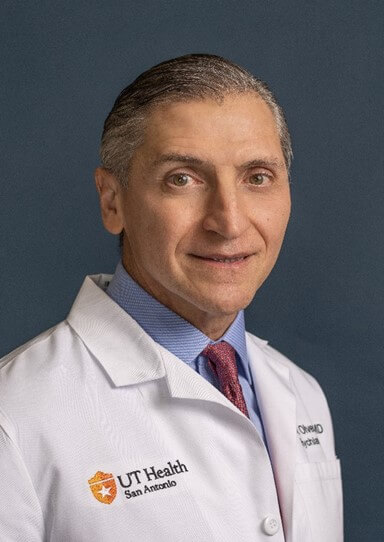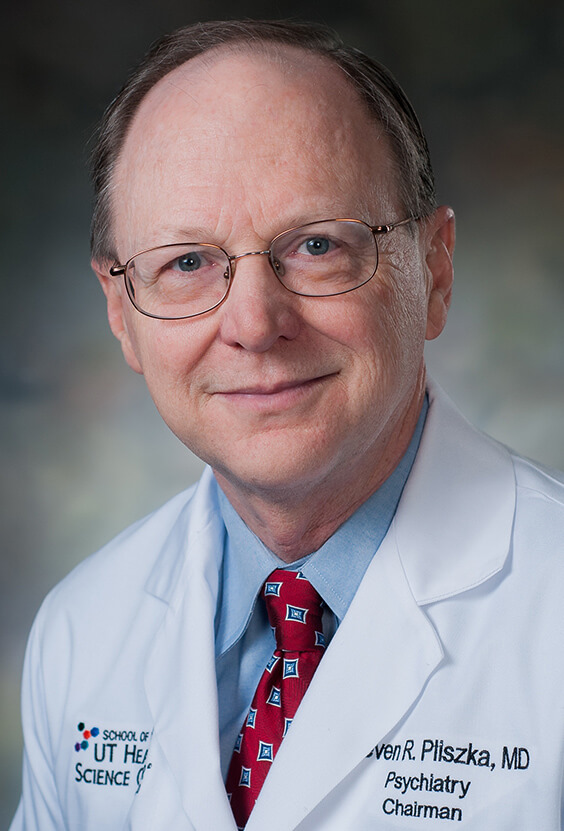This story is featured in the September 2024 issue of the Bexar County Medical Society’s San Antonio Medicine Magazine.
For the past decade, adolescent mental health disorders have skyrocketed, an issue propelled even further by the COVID-19 pandemic.
Mental health has declined surreptitiously for millions of people in recent years, affecting even the youngest among us. According to the American Academy of Child Psychiatry (AACAP), each year about one in six children aged 6-17 experiences a mental health disorder. Suicide is now ranked as the second leading cause of death in children aged 10-14. And only about half of children with a diagnosable mental health issue receive treatment.
The rise in mental health concerns is compounded further by a shortage of professionals choosing to work in the public sector, and specifically with adolescent mental health. The AACAP reports a severe nationwide shortage of child and adolescent psychiatrists. There are about 11,400 practicing child and adolescent psychiatrists (CAPs) in the U.S. In Texas, there are 853 CAPs, however 80% of the state’s counties have zero practicing CAPs. Bexar County has 91 CAPs with a ratio of about 18 CAPs per 100,000 children.
To address these chilling trends, child and adolescent mental health professionals and researchers at The University of Texas Health Science Center at San Antonio (UT Health San Antonio) are working toward skillful solutions for diagnosis, treatment and expanded access to care for this vulnerable population.
Family affair
Treatment of child and adolescent mental health is most successful when there is support from at least one trusted adult. Most children and teenagers do not choose to come to treatment on their own. Often parents, teachers or other adults in the child’s life are the first ones to express concern.
The presence of a caring, genuine adult can make a world of difference in the successful treatment of mental health disorders among children and adolescents. Aside from a family member, a trusted teacher, school counselor, coach can also be a positive figure in a child’s life. Initiatives are underway in many public schools to train educators to identify potential mental health concerns among children and adolescents.

“This is often a key intervention,” said Rene Olvera, MD, MPH, Dielmann Distinguished Professor and Chair of the Department of Psychiatry and Behavioral Science, Joe R. and Teresa Lozano Long School of Medicine, “We don’t expect everyone to be a therapist, but to know what is available and help the family navigate the system.”
The most common child and adolescent mental health conditions are anxiety, depression, attention deficit disorders, and severe aggression. While the COVID-19 pandemic magnified mental health concerns, there was already an emerging problem beginning around 2016, Olvera said. The global pandemic only amplified existing issues while piling on potential new stressors like loss of routine, parental death and fear for their safety.
“Developmentally, most teenagers do not sit around worrying about getting sick, and all of the sudden there was a huge intrusion on their lives,” Olvera said.
Adolescents already go through drastic developmental stages and may be dealing with psychosocial stressors such as bullying, relationship breakups, relocation or divorce. The breadth of stressors children and adolescents face only continues to multiply.
Adolescent mental health care is complex, and CAPs are trained to discern how conditions present differently at various ages and developmental levels. Many major psychiatric conditions do not fully express themselves until late adolescence or early adulthood. Some conditions can be treated with non-medication interventions, such as therapy, but others may require a combination of therapy and medication.
Spanning the state
One of the most expansive programs in recent years to address child mental health is the Texas Child Mental Health Care Consortium (TCMHCC). This state-funded program was approved during the 86th Legislature and expanded in 2021, through federal funding from the American Rescue Act. The consortium brings together the combined resources of higher education and mental health professionals to address mental health for children and adolescents throughout the state. Initiatives of the program include the Child Psychiatry Access Network (CPAN); Texas Child Health Access Through Telemedicine (TCHATT); Community Psychiatry Workforce Expansion; Child and Adolescent Psychiatry Fellowships; and research networks like the New and Emerging Children’s Mental Health Research Initiative (NECMHR).
Olvera, who previously served as the chief medical officer with the Center for Healthcare Services, local mental health authority for San Antonio and Bexar County, said one of the best parts of TCMHCC is that it improves access to care by attracting more child psychiatrists to work in the public sector through funding for fellowships, training programs and collaborative networks to encourage more professionals to choose this field.
CPAN is the furthest-reaching portion of the consortium, Olvera says. Since 2019, the network has enrolled more than 12,700 providers and 2,500 clinics that can consult with psychiatrists, request resources or get referrals. Through CPAN, the state’s counties are divided up between 11 medical schools to provide consultation services to pediatricians. Many mild to moderate mental health conditions can be treated by a pediatrician or primary care provider. Through this partnership, Olvera said, Texas pediatricians have become more comfortable treating children and adolescents with mental health concerns, knowing they have the support of the network. For major mental health problems, patients can be referred to a specialist.
“Helping pediatricians to feel comfortable treating mental health conditions removes delays in care caused by the shortage of child and adolescent psychiatrists,” Olvera said.
The coordination between the state’s local mental health authorities and academic institutions means less competition for manpower. Instead of a CAP having to choose between working in either the public sector or academia, they can be of service to both. Through the consortium, UT Health San Antonio is contributing to mental health assistance in several South Texas counties, most of which have zero or very few resources for child and adolescent mental health.
Mental health telemedicine
Telemedicine expansion has transformed the landscape of what is possible for child and adolescent mental health care. Children and their families that did not have the time, money or access to quality mental health care are now finding the resources they need through UT Health San Antonio and collaborations like the consortium’s TCHATT program.

Steven Pliszka, MD, professor of psychiatry at UT Health San Antonio is the director of the San Antonio TCHATT. The program works with area school districts to coordinate mental health therapy through telemedicine therapy sessions, all done conveniently at the child’s school and at no cost to the family. Pliszka said they have agreements with districts in Bexar County, throughout the Hill County and as far east as Victoria.
Through TCHATT, if a school identifies a child that may need mental health services, they contact the parent or guardian to discuss possible treatment through telemedicine. With parental consent, the therapist, child, and parent/guardian can participate in 4-8 therapy sessions. The child is provided a private room at the school and the session is conducted through video conference with the therapist and parent. If there is a serious mental health issue, or more intensive treatment is recommended, the family will be referred to one of the UT Health San Antonio clinics or a mental health clinic in their area. If a child has a condition that requires medications, they are referred to a nurse practitioner for a medication assessment.
“We have seen a wide variety of severities from mild adjustment problems to kids with very significant trauma histories,” Pliszka said.
Having the sessions during the school day minimizes the loss of learning time and the parent can join the virtual sessions without having to leave their home or place of employment.
Pliszka said the progress of the program has been phenomenal. So far, the TCHATT program has enrolled several hundred school districts throughout the state and conducted telemedicine sessions for nearly 2,000 students.
Improved access to treatment can’t come soon enough, Pliszka said, as incidents of anxiety and depression in children and adolescents have increased markedly in the past 10 years.
“It was already going up pre-COVID and we have continued this upward trend,” he said.
Research
UT Health San Antonio honors their commitment of service to the community in part through their continual research into innovative methods of diagnosis and treatment. In the domain of adolescent mental health, university scientists are exploring novel ways to diagnose conditions and personalize care.
Amy Garrett, PhD, associate professor in the departments of Psychiatry and Radiology at UT Health San Antonio, is studying how brain function changes when adolescents receive trauma-focused therapy for post-traumatic stress disorder (PTSD). Garrett is using magnetic resonance imaging (MRI) to measure brain function before, during and after 18 weeks of therapy. In her previous studies, she found that participants in the study showed improvement in their symptoms and that brain function was normalized after treatment. Her current research looks more closely to determine whether therapy leads to brain changes at specific times and, if so, when those changes occur.

Garrett said trauma-focused cognitive therapy is the “gold standard” treatment for trauma, and with research grants from the National Institutes of Mental Health and Baptist Health Foundation, licensed therapists on the research team are providing this therapy to the study’s participants at no cost.
During trauma-focused therapy, an individual works with a therapist to process thoughts, feelings and behaviors associated with trauma. This process can help to reduce the problematic symptoms that sometimes linger for months or years following a trauma.
Unfortunately, there are a great deal of young people in the San Antonio and the South Texas area that have experienced trauma. In this age group, many individuals are undergoing traumas related to domestic violence, sexual abuse and physical assault. Garrett said she is glad that young people are seeking therapy to address trauma because treatment at a young age can be very helpful for their academic and social development.

In July, UT Health San Antonio scientist Jessica Sandoval, MD, associate clinical professor with the Department of Psychiatry, Child and Adolescent Psychiatry Division, was awarded a $300,000 NECMHR grant for a two-year research project. Sandoval will be evaluating the impact of the quality of Spanish-language interpretation during psychiatric evaluation on children’s mental health outcomes. A secondary measure will be how quality of the interpretation impacts trust of the physician. Sandoval’s hypothesis is that quality of the language interpretation will impact patient outcomes and patient trust of their physician.
“Hispanic/Latino patients often have unmet mental health needs, with lower access to mental health care, underuse of mental health care, shorter duration in treatment when they do and treatment disparities. While having an interpreter addresses the language barriers that may exist, we do not know if the quality of that interpretation has any impact on patient outcomes and their ability to form a trusting relationship with their psychiatrist, which can be an important element of treatment,” Sandoval said.
The outcome of this research will inform mental health researchers about an unexplored area that could be contributing to disparities. Interventions may include improved training or interdisciplinary partnerships with interpreters to ensure providers understand the needs of their patients.
“Ultimately, we hope it improves linguistic minorities’ ability to communicate with their mental health care provider and have equitable care to their English-speaking counterparts,” Sandoval said.
Together we can make a difference
At UT Health San Antonio, medical professionals provide every patient with the same respect and quality care regardless of age, location or financial status. Through rigorous research, strategic collaborations and partnerships with local agencies we can make a difference in this current crisis of mental health among young people.
“We see where we all fit in the system of care, and we all need to work together to succeed. We want every health care system here to be healthy because we need everybody, both private and public,” Olvera said.


